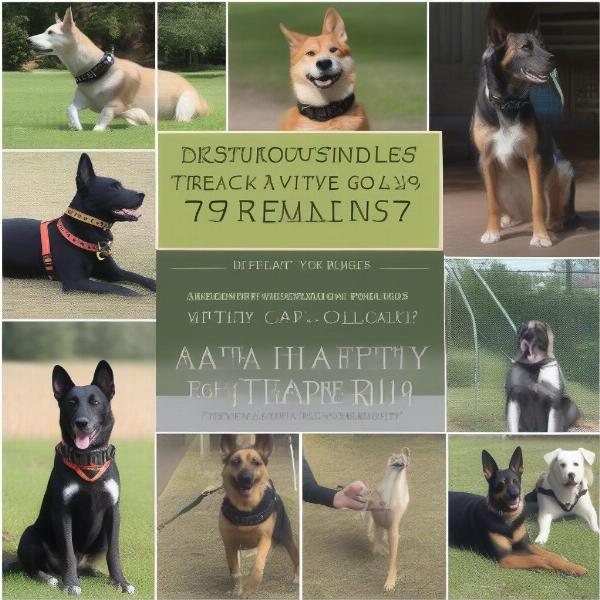K9 dog collars are a crucial piece of equipment for any dog owner, whether you’re training a working dog or simply walking your furry companion. Finding the perfect collar involves considering your dog’s size, breed, activity level, and training needs. This guide will help you navigate the world of K9 dog collars, providing expert advice and practical tips for choosing the best option for your canine friend.
Understanding the Different Types of K9 Dog Collars
Choosing the right K9 dog collar requires understanding the various types available, each designed for specific purposes and training methods. From basic flat collars to specialized training collars, the options can seem overwhelming. Let’s break down the most common types:
- Flat Collars: These are the most common type of collar, ideal for everyday use and displaying identification tags. They’re typically made of nylon, leather, or other durable materials.
- Martingale Collars: These collars are designed to tighten slightly when a dog pulls, preventing them from slipping out. They’re a good option for dogs who tend to escape from their collars.
- Prong Collars (Pinch Collars): These collars feature metal prongs that tighten around the dog’s neck when they pull, providing a correction. They should only be used under the guidance of a professional dog trainer.
- Choke Chains (Slip Chains): These collars consist of a chain that tightens around the dog’s neck when pulled. They can be harmful if used incorrectly and are generally not recommended for average pet owners.
- Head Halters: These collars attach around the dog’s muzzle and head, providing more control over their movements. They can be beneficial for dogs who pull excessively on leash.
- Tactical Collars: These heavy-duty collars are often used for working dogs and feature features like handles, D-rings, and Velcro patches.
Choosing the Right Size and Fit for Your K9 Dog Collar
Proper fit is essential for your dog’s comfort and safety. A collar that’s too tight can restrict breathing, while a collar that’s too loose can slip off. Measure your dog’s neck circumference and add two fingers’ width to determine the correct collar size.
How to Measure Your Dog’s Neck
Use a flexible measuring tape to measure around the base of your dog’s neck, where the collar would normally sit. Ensure the tape is snug but not too tight.
Material Matters: Durability and Comfort
K9 dog collars are made from various materials, each with its pros and cons. Consider your dog’s lifestyle and the intended use of the collar when selecting a material:
- Nylon: Durable, lightweight, and easy to clean.
- Leather: Strong, stylish, and softens over time with proper care.
- Metal: Heavy-duty and often used for training collars.
- Biothane: Waterproof, odor-resistant, and easy to maintain.
“Choosing the right material is crucial for both comfort and longevity,” says renowned canine behaviorist, Dr. Emily Carter. “A comfortable collar encourages positive training experiences, while a durable material ensures the collar can withstand the rigors of daily use.”
K9 Dog Collars for Specific Purposes
Different activities and training methods may require specialized K9 dog collars:
- Tracking: A lightweight, comfortable collar that won’t interfere with the dog’s scent work.
- Protection: A sturdy, durable collar with a secure buckle or fastener.
- Agility: A lightweight, non-restrictive collar that allows for freedom of movement.
 K9 Dog Collars for Different Activities
K9 Dog Collars for Different Activities
Maintaining Your K9 Dog Collar
Regular cleaning and maintenance will extend the life of your dog’s collar. Follow the manufacturer’s instructions for cleaning and inspect the collar regularly for signs of wear and tear.
“Remember, a well-maintained collar is not only more comfortable for your dog, but it also ensures its continued effectiveness,” adds Dr. Carter.
Conclusion
Choosing the right K9 dog collar is a crucial decision for any dog owner. By considering your dog’s individual needs, activity level, and training goals, you can select a collar that promotes both comfort and control. Remember to prioritize proper fit, durable materials, and regular maintenance to ensure the longevity and effectiveness of your chosen collar. K9 dog collars are an essential tool for responsible dog ownership, contributing to a happy and well-trained canine companion.
FAQ
-
What is the best type of K9 dog collar for a puppy? A lightweight, adjustable flat collar made of nylon or leather is typically recommended for puppies.
-
How often should I clean my dog’s collar? Clean your dog’s collar every few weeks or as needed, depending on how dirty it gets.
-
Can I use a prong collar on my dog? Prong collars should only be used under the guidance of a certified professional dog trainer.
-
What is the difference between a martingale collar and a choke chain? A martingale collar tightens slightly when a dog pulls, while a choke chain can continuously tighten and potentially cause harm if used incorrectly.
-
What is a tactical dog collar used for? Tactical collars are typically used for working dogs or in situations requiring extra control and durability.
-
How do I know if my dog’s collar fits correctly? You should be able to fit two fingers comfortably between the collar and your dog’s neck.
-
What material is best for a K9 dog collar? The best material depends on the intended use and your dog’s lifestyle. Nylon is durable and easy to clean, while leather is strong and stylish.
About ILM Dog
ILM Dog is your trusted international resource for all things dog-related. We offer expert advice on dog breeds, health and medical care, training and behavior, nutrition, grooming, exercise, puppy and senior dog care, traveling with your dog, and the best products and accessories. We are passionate about providing dog owners with the knowledge and resources they need to nurture happy, healthy, and well-behaved canine companions. For inquiries or to learn more about our services, contact us via email at [email protected] or by phone at +44 20-3965-8624. Visit ILM Dog today for comprehensive guides and expert advice on dog care.